Sometime around 2011, Keith Richards was ready to retire from his life in rock ’n’ roll. Approaching half a century with the Rolling Stones, he had done it all. “I know what luck is. I’ve had a lot,” he reflected in an interview this month.
He’s the archetypal rock guitarist: the genius wastrel, the unimpeachable riff-maker, the architect of a band sound emulated worldwide, the survivor of every excess. Onstage, he is at once a flamboyant figure and a private one, locked in a one-on-one dance with his guitar, working new variations into every song.
“I never play the same thing twice,” he said. “I can’t remember what I played before anyway.”
With the Stones in “hibernation” after a tour that ended in 2007, Mr. Richards took two and a half years “immersed in my life twice” to write (with James Fox) a best-selling memoir, “Life,”that re-examined his many sessions, tours, trysts, addictions, mishaps, arrests and accomplishments. After “Life” was published in 2010, he was enjoying being a family man and a grandfather. Retirement was a real possibility.
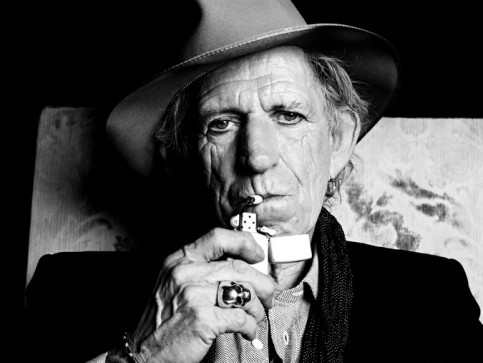
“I thought, that’s the craziest thing I ever heard,”
said Steve Jordan, Mr. Richards’s longtime co-producer and drummer on his solo projects.
“He felt comfortable with where he was and what he had done and what he had achieved. But knowing Keith, to not have him pick up an instrument and play, it was weird. When you’re a musician, you don’t retire. You play up until you can’t breathe.”
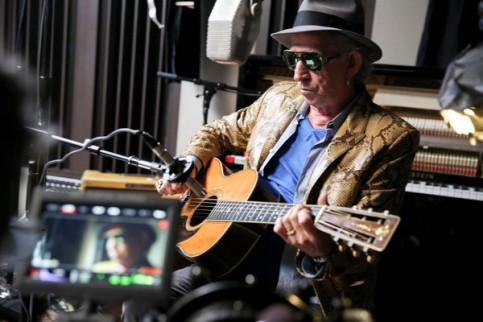
Mr. Jordan nudged Mr. Richards in a different direction: back into the recording studio to make his first solo album in 23 years, “Crosseyed Heart” (Republic), to be released Sept. 18.
“I realized I hadn’t been in the studio since 2004 with the Stones,” Mr. Richards said. “I thought: ‘This is a bit strange. Something in my life is missing.’ ”
It’s a straightforwardly old-fashioned, rootsy album that could have appeared 20 years ago. The instruments are hand-played, the vocals are scratchy growls, and the songs revisit Mr. Richards’s favorite idioms — blues, country, reggae, Stonesy rock — for some scrappy storytelling. The album was recorded on analog tape. “I love to see those little wheels go around,” Mr. Richards said.
Eased onto a couch at his manager’s downtown Manhattan office, surrounded by merchandise from this year’s Rolling Stones tour and memorabilia dating back decades, Mr. Richards, 71, alternated between a Marlboro and a drink. He was wearing an ensemble only he could pull off: a striped seersucker jacket over a black T-shirt decorated with a Captain America shield, black corduroy jeans and silvery-patterned running shoes. A woven headband in Rastafarian red, gold and green held back his luxuriantly unkempt gray hair. A silver skull ring was, as usual, on his right hand as a reminder, he has said, that “beauty’s only skin deep.”
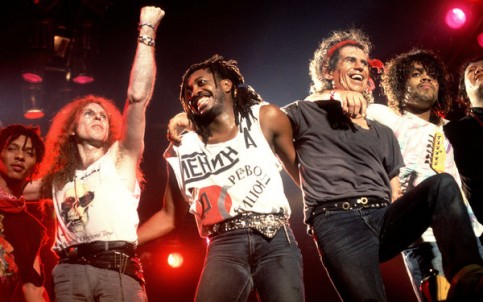
In a conversation punctuated by his wheezy, conspiratorial growl of a laugh, he was a man at ease with himself as a rock elder. “It’s all a matter of perspective and which end of the telescope you’re looking at,” he said.
“Nobody wants to croak, but nobody wants to get old,” he said. “When the Stones started, we were 18, 19, 20, and the idea of being 30 was absolutely horrendous. Forget about it! And then suddenly you’re 40, and oh, they’re in it for the long haul. So you need to readjust, and of course kids happen and grandchildren, and then you start to see the pattern unfolding. If you make it, it’s fantastic.”
Mr. Richards has outlived many of his longtime musical collaborators, most recently the Stones’ saxophonist Bobby Keys, who made one of his last studio appearances on Mr. Richards’s album. Born the same day as Mr. Richards, he died in December. “You get used to losing good friends,” Mr. Richards said. “They keep croaking on me.”
His enduring attachment is to music, and to his guitar.
“I get into a very warm relationship with the guitar. I sleep with it at times,” he said. “There would be no ‘Satisfaction’ if I hadn’t been sleeping with the guitar in the bed that night. Apparently I woke up in the middle of the night and hit a button on this new thing at the time, a cassette machine. But I did this all either in a dream or in my sleep and wrote ‘Satisfaction.’ Without the guitar being right next to me I wouldn’t have done it. Not that I sleep with it every night — the old lady would complain.” (He has been married to Patti Hansen since 1983.)
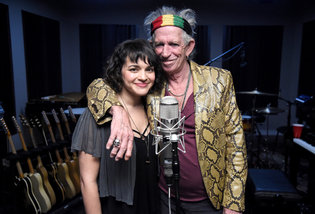
A new documentary, “Keith Richards: Under the Influence,” was directed by Morgan Neville (the Oscar-winning “20 Feet From Stardom”) and will be shown via Netflix beginning Sept. 18. It includes recording sessions for “Crosseyed Heart,” glimpses of the Rolling Stones’ past and Mr. Richards’s return visits to cities like Chicago and Nashville. The “influence” of the documentary’s title is musical, not pharmaceutical, as Mr. Richards recalls all the idioms he has absorbed, among them flamenco and jazz. In the documentary, Mr. Richards also observes:
“I ain’t a pop star no more, y’know? And I don’t want to be.”
Pop fame, he now insists, was never his goal.
“I only did it by accident. All I wanted to do was play. And then given the time that we were working in, ’63, ’64, you realized you can’t just sit around and make records. You have to become famous,” he said. “To tell the truth, I didn’t mind it once it was going. I mean, I’m 19 and all these chicks are screaming at me,” more amorous, he added, than they had been six months earlier. “But at the same time you’ve done the crossroads bit without knowing it”
— that is, in blues lore, selling one’s soul to the Devil.
“At times, it can be a bit annoying, but who are you to get annoyed because people like you?” he said with a chuckle. “Live with it, pal.”
Mr. Richards’s solo career started amid strife in the Rolling Stones, a period in the late 1980s that he has called the band’s “World War III.” Mick Jagger, his partner in songwriting and producing, had chosen to make solo albums with younger, au courant collaborators. Mr. Richards decided to dig into his own, bluesier music, anchored by Mr. Jordan on drums, with whom he had backed Chuck Berry in the tense 1987 documentary “Hail! Hail! Rock ’n’ Roll.”
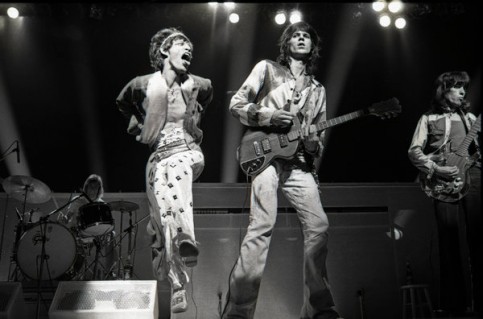
For Mr. Richards’s first solo album, “Talk Is Cheap,” in 1988, they assembled a band of seasoned studio musicians, including Waddy Wachtel on guitar and Ivan Neville on keyboards, who would go on to tour with Mr. Richards as the X-Pensive Winos and make a second album, “Main Offender,” in 1992. “Talk Is Cheap” featured “You Don’t Move Me,” a direct taunt at Mr. Jagger’s solo efforts: “You lost the feeling/Not so appealing.”
Things are more diplomatic now. The Stones endure, with concerts planned in South America early next year. “Healthy competition is O.K.,” Mr. Richards said.
“Mick and I’s relationship is, we’ve known each other longer than anybody else. We’ve known each other since we were 4 or 5 years old. There’s been a lot of gaps in between, but at the same time, you’ve known somebody from the playground. We twist and turn. I mean, yeah, now and again we have beefs because we’re like brothers in that respect, and what brothers don’t have beefs now and again?”
But after years of inactivity, the Rolling Stones stirred only once Mr. Richards was recording again. The making of “Crosseyed Heart” was interrupted by a handful of Rolling Stones concerts marking the band’s 50th anniversary in 2012. And before Mr. Richards could allot time to promote “Crosseyed Heart,” the Stones geared up for this year’s American tour.
“The record’s been finished for about a year, but then the Stones go back into work. Oh, right,” Mr. Richards said. “We’ve been holding it back and finding the right space to put it out. But the Stones won’t be working again until next year. So I do have this space to do something on my own without anybody getting their feathers ruffled.”
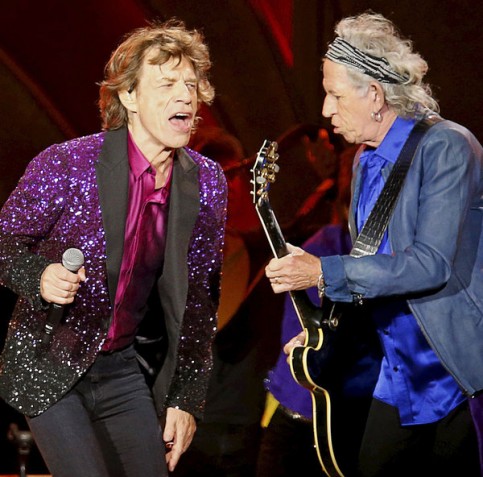
“Crosseyed Heart,” Mr. Richards said, is the first album he has made without a deadline. Mr. Jordan described the sessions as “very civilized,” just one or two afternoons a week.
“Which is very different from the other albums,” Mr. Jordan added, “when we would start at midnight and end at 8 a.m.”
The album gathered momentum after a tentative start. “He felt rusty,” Mr. Jordan recalled. “But his facility started coming back to him, and then the fire started to return, and the energy got ramped up, and then all of a sudden we were making a record.”
Mr. Wachtel and Mr. Neville returned for some tracks, though much of the album comes down to Mr. Jordan’s beat and Mr. Richards on guitars, bass and piano. On his own, he matches the loose-but-tight mesh of rhythm and lead guitar that he gets with Ronnie Wood in the Rolling Stones.
“He’s a counterpuncher,” Mr. Jordan said. “If you have a driving beat, he can just jab; you throw a punch, he comes right back.”
The earthy momentum of the music carries lyrics full of contentious romance, hard knocks and betrayals, in songs with titles like “Trouble,” “Amnesia,” “Substantial Damage” and “Suspicion.” More than one lyric, as in “Nothing on Me” and “Robbed Blind,” worries about encounters with the police. “My life is getting busted and getting out of it,” Mr. Richards said.
“Writing the book brought back certain things. So much has happened and sometimes you just forget about it. Especially getting busted is not something you want to dwell on. But then you think about it, and you think, maybe there’s a song in there.”
In “Illusion,” the voice of Norah Jones suddenly wafts up; it’s a troubled couple’s ballad for which Ms. Jones wrote the woman’s side of the dialogue. “It’s got a slow burn,” she said admiringly.
“I wanted it to sound like an early-morning argument, or a very late-night one.” Recording it was “pretty old-school,” she recalled. “We only did three takes, and they took the first one. It’s not like it has to be perfect — it has to be real, especially with Keith.”
Mr. Richards hopes to reconvene the X-Pensive Winos for at least a handful of shows before the Rolling Stones go back on the road. He’s also impatient for the Stones to make another album.
“My favorite dream is to get the Rolling Stones off of a tour and straight into the studio,” he said. “It’ll probably never happen, but I can hear the band that tight, when it’s really honed and toned and all the screws are in the right place. A lot of the earlier records we made were in between tours. We’d come straight off the road and go straight into the studio, which is why some of those records have so much bounce and hit on them — the energy.”
He added:
“We’re playing South America in February and March, and I would like to get in the studio around April or May next year. It’s been too long. They need to record. I can feel something in my bones saying we have to record. And maybe this” — his solo album — “will be a little kick up the arse.”
His eyes light up and his smile broadens when he talks about performing.
“People keep asking questions about, ‘How do you do it?’ I was made to do it,” he said. “Playing live, that’s the essence of what I do. As I say to Ronnie when we go onstage, ‘Right, now we can get some peace and quiet.’ There, nobody can disturb us. We’re invulnerable.”

You must be logged in to post a comment Login